Do I need to pick leaves from cucumbers and how to do it?
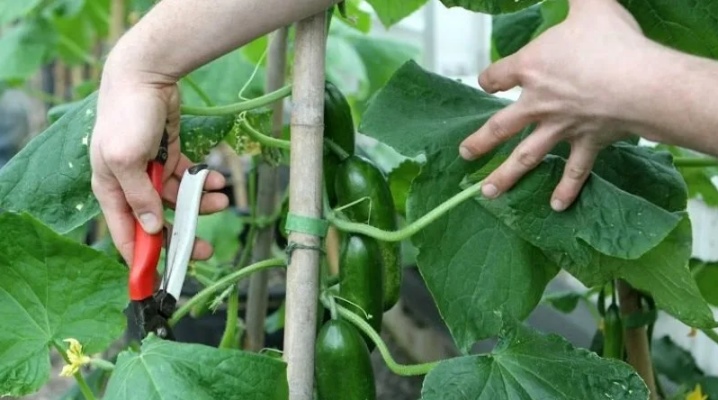
Cucumbers are grown by almost all summer residents, but novice gardeners do not always understand: whether it is necessary to pick leaves from cucumbers, and if so, which ones. In the article, we will talk about the need for such a procedure, about the basic rules for removing leaves, we will consider what kind of pruning of cucumbers is, and at what time it is better to carry it out.
The need for a procedure
Should you pick leaves from cucumbers? Undoubtedly yes! So any experienced gardener will answer. This culture is from the liana-like family and forms a long vine. So, if you do not cut off the excess green mass, it will grow strongly and will not give an opportunity to develop the fruits.
The bush will give all its strength to unnecessary elements - in this case, you can forget about the harvest. But then what is the point of growing a crop that does not bear fruit? Let's designate some of the advantages of such a technique in caring for a cucumber crop, such as removing excess foliage:
-
when trimming excess leaves, the plant is able to form more female inflorescences, which gives a high chance of good fruiting;
-
this procedure accelerates the ripening time of cucumbers;
-
bushes get sick less and are not so exposed to the invasion of pests;
-
less water has to be spent when irrigating and nutrients when feeding the bushes;
-
in general, the yield increases, and the quality of the ripened vegetables improves.
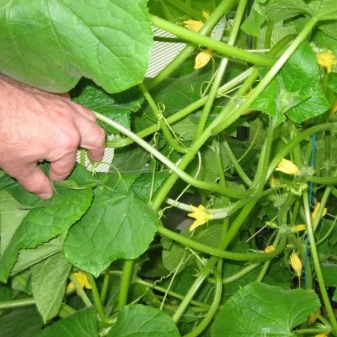
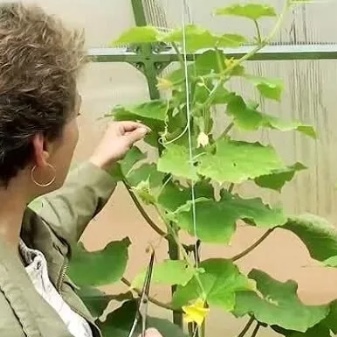
The unrestrained growth of cucumber vines needs to be controlled: remove not only damaged leaves, but also numerous extra shoots - all this allows sunlight to freely penetrate the beds, creates conditions for normal photosynthesis and increased productivity.
In addition, the culture is very susceptible to infections and diseases, therefore, excessive overgrowth of bushes should not be allowed, because in a poorly ventilated space there is a high probability of infection spread. After all, moderate cleaning will allow the plant to grow and harvest without difficulty.
But this procedure must be carried out subject to compliance with technological requirements. Let us dwell further on the basic rules for removing excess foliage from cucumbers.
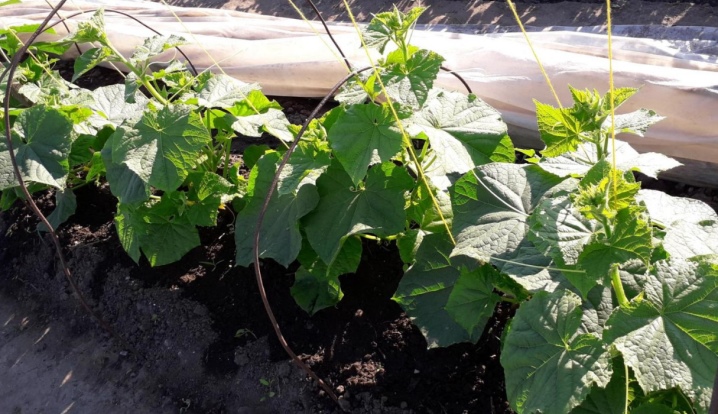
Fundamental rules
The vine is formed by removing the lower leaves, side stepchildren, getting rid of barren flowers. In order to prevent the development of root rot, the first part of the vines is well cleaned: rid this area of all inflorescences and side shoots, as well as leaves that touch the ground and have already turned yellow.
Such cleaning will create good ventilation and allow the plant to direct nutrients to the vegetable formation zone. In hybrid cucumbers, the entire upper part is removed from the 6th eye, and the next 3 lateral shoots are left for fruiting.
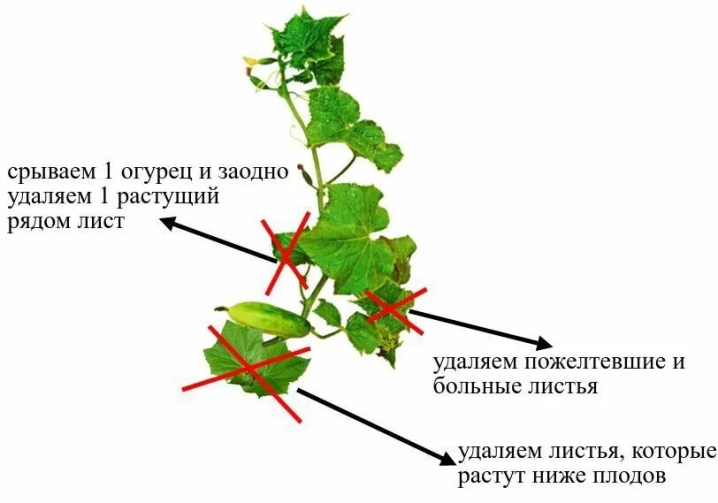
Types of trimming
Cucumber culture differs in that it has inflorescences of both sexes. Fruits are not formed from the male ones - these are barren flowers, and they grow on the main trunk. So, in order to achieve a good harvest, all barren flowers must be removed.
But the leaves near them are not removed, they serve as a "conductor" of food for the bush - through them useful substances come to the plant. The female inflorescences that form the fruit are on the lateral branches. Let us consider in detail the known methods of pruning cucumber liana.
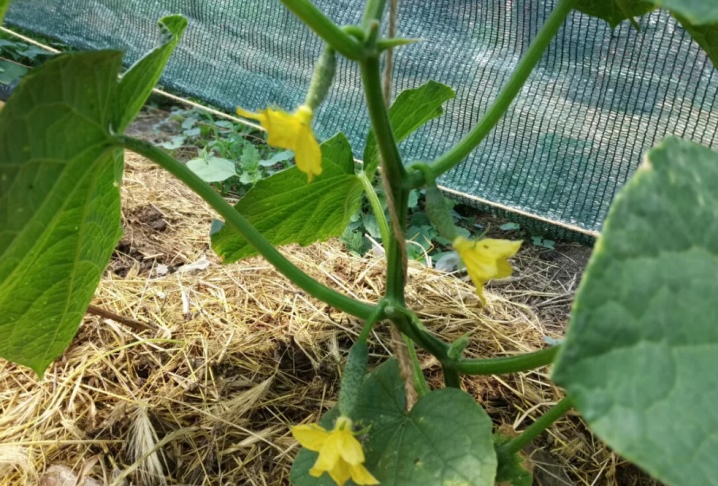
General
General pruning applies to all cucumber varieties, especially self-pollinating ones. They form cucumbers on the main stem, but some of the inflorescences for fruit ovary can be left on the lateral parts. By the way, on the main stem, fruiting is also formed in hybrids.
The cucumber vine also has 4 growth parts:
-
the bottom (lash near the ground) is considered the first part;
-
plus 1 meter (for 4 growth nodules) - the second part;
-
another plus 0.5 meters - the third part of the lash;
-
the top of the vine is the fourth part.
With general pruning, the actions are as follows.
-
At the bottom (lower part), all inflorescences, barren flowers are removed, and side shoots, yellowed, damaged foliage are also disposed of.
-
In the fourth (upper) part, everything is removed after the 6th leaflet, thereby ensuring the development of lateral shoots.
-
On the second part (50 cm - 1 m), it is enough to leave 3 main sprouts, and you need to get rid of the rest.
-
On each of the 3 sprouts, 4 sprouts are subsequently left.
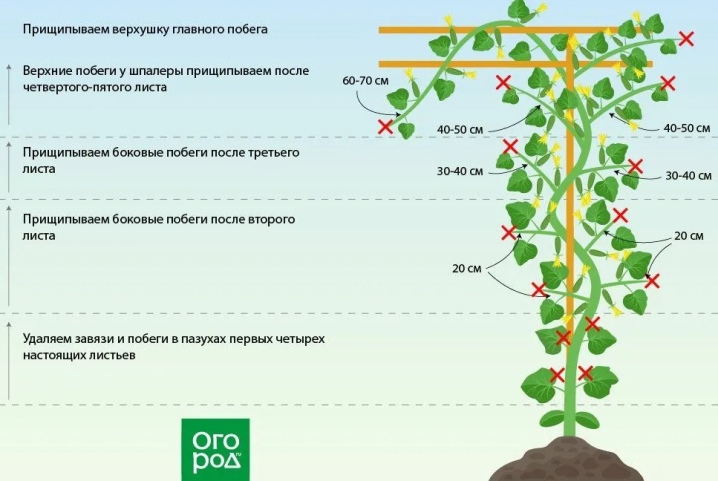
Sanitary
Sanitary pruning is arranged when aphids or mealy bloom appear on the cucumber foliage, there are rotten leaves with brown or yellow spots on the vine. All unhealthy elements are removed and destroyed away from the beds.
Brightening
This type of pruning is carried out for weakened bushes, as well as for diseased plants. It is better to clean the green mass in the rain. Brightening cleaning is carried out in the following order:
-
get rid of side shoots;
-
tear off leaves that create a shadow and interfere with the penetration of sunlight;
-
tear off deformed and yellowed foliage;
-
for the formation of fruits, 2-3 eyes are left.
Sometimes, for better fruiting, the lateral processes in the first nodes are not removed. They are redirected down to the soil - this stops the growth of the stem, and conditions are created for the active growth of fruits.
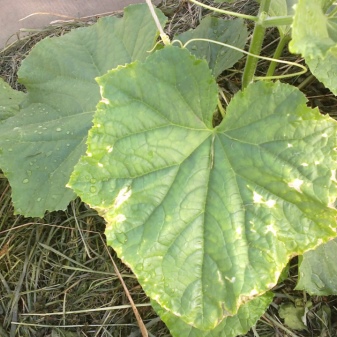
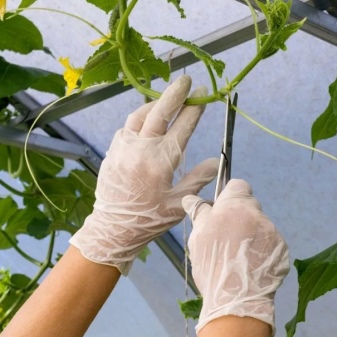
Schemes
Removal of leaves from a cucumber crop occurs according to two schemes: universal, classical, which is applicable for almost all types of cucumbers, and according to separate instructions, climbing varieties (including those growing in a greenhouse) are cut.
Classic
With the classic "haircut", you need to cut off all the lower leaves and inflorescences that are adjacent to the ground surface, or pull them down to the support and tie them up. Further, starting from 2-3 nodes, you need to remove 1-2 leaves and the same number of inflorescences. When the half-meter mark is reached, the stepsons are torn off on the lash. When the vine reaches the desired height, it will be correct to pinch off the top and remove all the upper leaves, up to the fifth node.
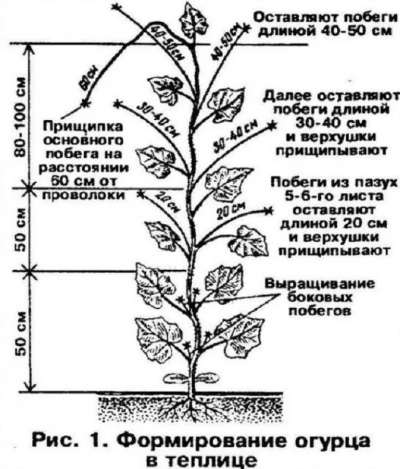
For climbing varieties
For climbing and cotyledonous cucumbers, the instruction is somewhat different.
-
As soon as the vine reaches a height of 1.2-1.5 m, remove all leaves and sides at 1-3 nodes.
-
In parallel with this, pinching of all stepsons is carried out on the sides after 2-3 inflorescences (at a height of 0.25 m).
-
To clarify, the beds are removed through one leaf at the bottom of each shoot.
This scheme is effective in greenhouse conditions and allows gardeners to get the maximum harvest all summer and even in early autumn. Subject to all agrotechnical rules for care, the fruits will set, regardless of the weather.
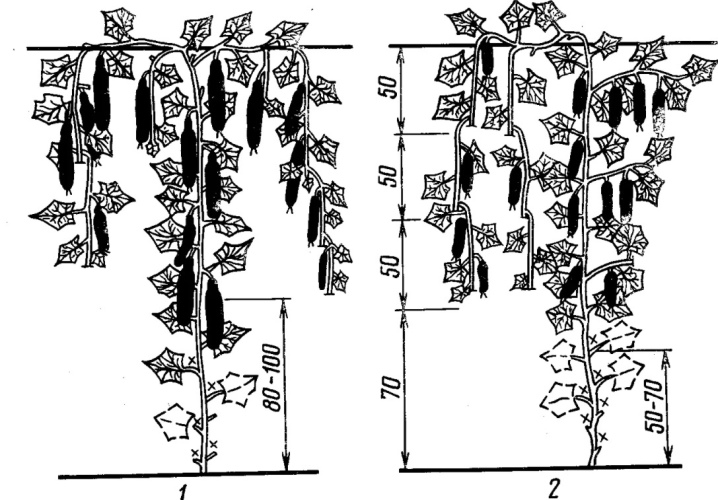













The comment was sent successfully.